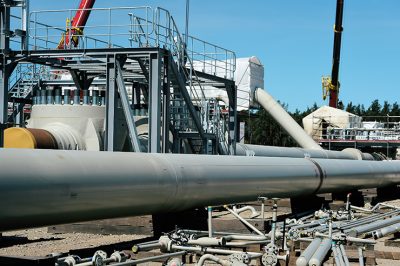Algeria to Central Europe: NATO Plans Gas Pipeline from Spain to Germany – Reports

All Global Research articles can be read in 51 languages by activating the “Translate Website” drop down menu on the top banner of our home page (Desktop version).
To receive Global Research’s Daily Newsletter (selected articles), click here.
Visit and follow us on Instagram at @globalresearch_crg.
***
NATO plans to build a gas pipeline from Spain to Germany – media
By 112 Ukraine
February 7, 2022
NATO is considering building a pipeline from Spain to France and Germany that will “reduce Central Europe’s dependence on Russian gas.” This was reported by La Vanguardia, citing sources in the Spanish government.
“The gas pipeline between Spain and Germany will reduce Central Europe’s dependence on Russian gas in the coming years,” the statement said.
According to the agency, the construction of a new Trans-Pyrenean connection to send gas from Algeria to Central Europe is being considered. It is noted that there are eight regasification stations required for liquefied gas treatment in the Iberian Peninsula, namely in Spain and Portugal.
It is noted that the authorities are studying the option of restarting the Midcat project, which was stopped three years ago. The project involves the creation of a Mediterranean gas corridor to deliver gas from Algeria to central Europe. The newspaper claims that Germany is extremely interested in it.
It was reported earlier that the authorities of Poland and Ukraine are discussing the construction of a joint gas pipeline to transfer large volumes of gas from west to east in the near future.
*
NATO Reportedly Contemplates Building New Pipeline in Bid to Reduce Dependency on Russian Gas
By Tasnim News
February 6, 2022
NATO has plans to build a pipeline that would connect Catalonia, Spain and France in order to reduce Europe’s reliance on Russian natural gas, the Spanish newspaper La Vanguardia reported, citing anonymous sources in the country’s government.
The proposed structure could reportedly be used to transfer around 7 billion cubic meters of natural gas per year from Algeria and foreign LNG shipments. The latter could be stored and processed in eight LNG plants located in Spain and Portugal, the newspaper said. La Vanguardia’s sources claim the proposal is on NATO’s “working table” and that Germany is “very interested” in the project, Sputnik reported.
The pipeline project itself is not new and is known as Midcat. It was first proposed three years ago, but was rejected by Spanish and French regulators as potentially unprofitable due to Europe’s plans to achieve net-zero emissions by the middle of the century via the use of green energy.
The reports of a new pipeline being discussed come in the wake of a tough year for the European energy industry, which faced spiking gas prices in 2021. The price tag first breached the ceiling of $1,000 per thousand cubic meters due to the EU’s reservoirs being half full after a tough winter, only to reach $2,000 at the end of the year.
The skyrocketing prices were generally put down to the EU’s failure to fill up its reservoirs in 2021, growing consumption amid the closing of several nuclear power plants in Europe, and the failure to buy extra LNG abroad due to Asian nations buying up all the free stocks of it. Yet, numerous European politicians and their American allies blamed Russia and the EU’s dependency on gas supplies from Moscow.
Moscow and the Russian gas exporting company Gazprom rejected the accusations, with both stressing that the country has fulfilled all of its contractual obligations on natural gas supplies.
At the same time, a joint EU-Russian venture, the Nord Stream 2 gas pipeline, which was finished in September 2021, still remains non-operational due to a lack of certification. The process of issuing the latter was put “on pause” according to German Foreign Minister Annalena Baerbock. Berlin claims the pipeline, which could pump up to 55 billion cubic meters of gas per year, might be violating European energy laws, specifically the Third Energy Package.
However, there have been several media reports, as well as suggestions from American politicians, that Nord Stream 2’s future might fall victim to Western sanctions against Russia in the context of ongoing tensions around Ukraine.
*
Borrell: US, EU to help Ukraine develop energy security
By 112 Ukraine
February 7, 2022
Ukraine is now better prepared for any conflict but it still needs to increase investments in its own sources of renewable energy
EU High Representative for Foreign Affairs and Security Policy Josep Borrell claimed that the U.S. and the EU will jointly assist Ukraine with maintaining the energy security. The politician wrote that on his blog on the website of the European External Action Service.
“While we seek to address the EU’s own energy and climate goals and enhance our resilience, we must do the same for Ukraine. In terms of energy security, Ukraine today is already better prepared for any conflict. As in the rest of Europe, true energy security can however only come through more investment in domestic renewables and better connections with the EU market”, reads the message.
Before going to the session of the EU-US Energy Council in Washington, Borrell claimed that the meeting “will be an opportunity to seek even tighter coordination on energy market reforms needed in Ukraine to reinforce corporate governance and transparency ahead of Ukraine’s synchronisation to the European electricity network, planned in 2023”.
*
Note to readers: Please click the share buttons above or below. Follow us on Instagram, @globalresearch_crg. Forward this article to your email lists. Crosspost on your blog site, internet forums. etc.
Rick Rozoff, renowned author and geopolitical analyst, actively involved in opposing war, militarism and interventionism for over fifty years. He manages the Anti-Bellum and For peace, against war website.
He is a Research Associate of the Centre for Research on Globalization (CRG).

